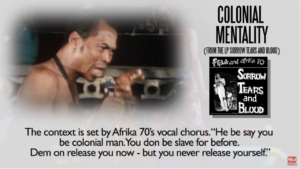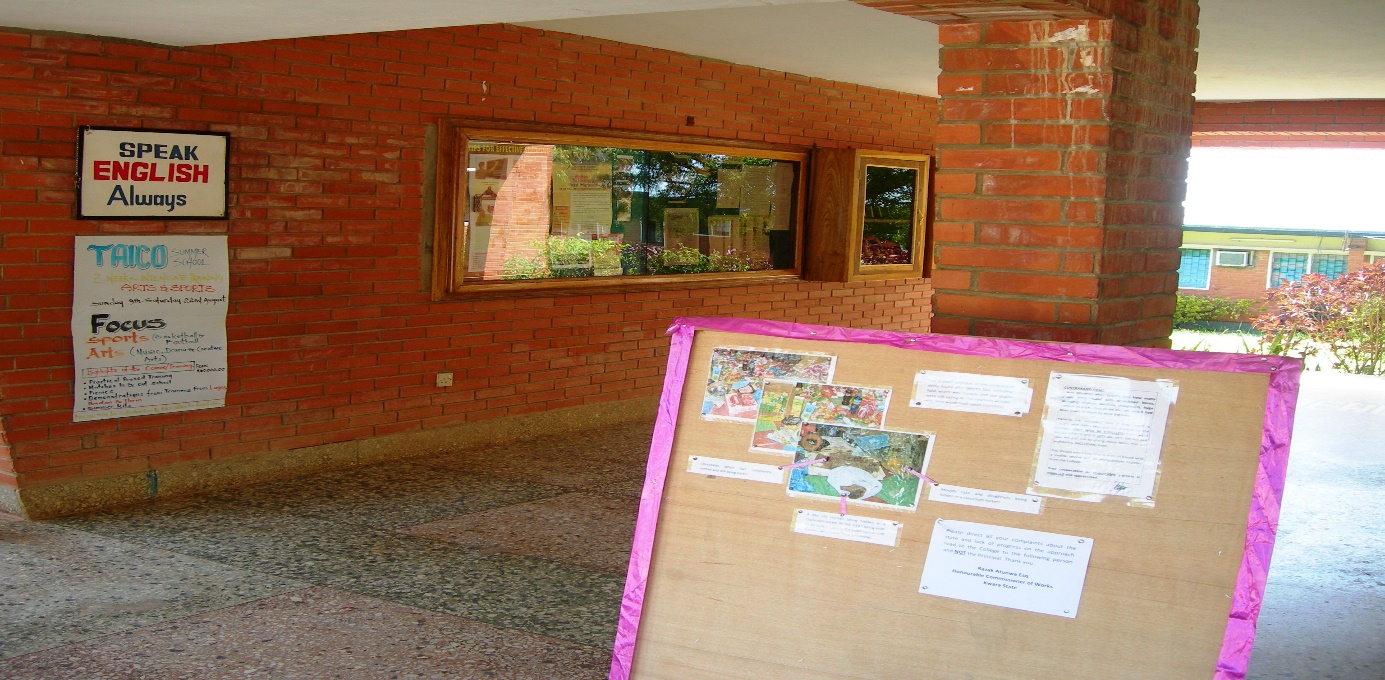
| Home |
| Theme |
| Presentations |
| Blogs |
| Podcasts |
| Country profiles |
| Kora and films |
Colonial mentality: Decolonising thoughts on African indigenous languages and scientific education
By: Taiwo Oloruntoba-Oju
March 30, 2021
Taiwo Oloruntoba-Oju is a George Forster scholar of the Alexander von Humboldt Foundation currently at the University of Chemnitz, Germany.
Sundry neo-colonial narratives continue to manifest the old imperialist/colonial process of appropriating of positive values for things Western and ascribing negative values to things non-Western. A key example of the latter is the notion that indigenous African languages may not be suitable for 'scientific education'. Also related is the continuous laundering of the colonial image in academic circles, through narratives that indirectly valorise colonial impositions that Africans have had to live with. 'Decolonising the mind' entails paying attention to these insidious modes of colonialism and the corresponding colonial mentality that tends to afflict the coloniser and the colonised, albeit in different ways and with different consequences.
Explicit forms of colonial hegemony over Africa are also very much in evidence on the continent. Explicit particulars such as the brutal enslavement of Africans over centuries dovetailing into forced colonial dominion over African entities are fairly well known. That colonialism in Africa then transited into a continuous neo-colonial grip on the African economy and on African lives, through a global imperialist/capitalist industrial complex, and through the sustenance of a comprador clientele amongst the previously colonised, is also well known. Proposals for the actual recolonization of Africa have also been made quite openly in recent times in different guises, as much in treatises by private European citizens, as in speeches by prominent European politicians, as Stefan Jonsson wrote. However, this piece is not so much about such explicit particulars as about the more insidious forms of continuing colonization.

Source: https://www.youtube.com/watch?v=bC6ouP7qRoQ
Let us begin, then, with the aspect of language. In 1850, visiting evangelists found exquisite uses of African indigenous language amongst the Yoruba in present day Nigeria. As I have also noted elsewhere, Bishop Samuel Ajayi Crowther and his visiting colleagues took particular note of 'sententious sayings … everywhere in the mouths of all, imparting a character to common conversation, and marking out a people of more than ordinary shrewdness, intelligence, and discernment'. Yet, the dominant Western narrative of Africa in the 19th and much of the 20th century was that of a people with no history, no culture, and no language. Joseph Conrad in his infamous Heart of Darkness (in 1899, up to half a century after Crowther's observation) was to propagate this notion by assigning to the 'negroes' whom he encountered in his expedition, not language, but 'a violent babble of sounds'.
The assignment of low prestige to non-Western languages today follows this trajectory. From about the late 19th century notions of the superiority of imperialist languages were channelled into language and anthropological studies, thus marking the transition from explicit colonial narratives to more insidious ones in the domain of language. In what was to become known as 'scientific racism,' 'expert findings' affirmed these narratives in the form of concepts such as linguistic determinism, or linguistic relativity (the so-called Sapir-Whorf hypothesis). The strong form of linguistic relativity advances the view that language determines cognitive capacity, or, put differently, that the type of language spoken by a community determines the cognitive scope of members of the community. This notion set off a frenzied search by many Western anthropologists and linguists for 'evidence' of such lack of cognition amongst, of course, conquered communities. Benjamin Whorf's 'Science and Linguistics' in 1940 became a catalyst for the search for the relativity status of 'primitive' languages. As Migge & Léglise noted recently: 'indigenous languages were linked to tribes, 'uncultured' naturalness and lack of military power and were referred to by negative terms such as 'dialect', 'vernacular' and 'patois' implying their inferior status'.

Western languages continue to enjoy superlative patronage through political and academic institutions. (Source, see: Location of African Culture Beyond Afroscepticism).
Till date, Western languages have continued to enjoy superlative patronage through political and academic institutions in the once colonised entities in Africa, as well as in neo-colonial narratives such as the above. On the other hand, protective stances towards African languages are generally dubbed traditionalist, nativist and, again as Migge and Léglise put it, 'a sign of ignorance and opposition to modernity'.
The notion noted above, that African indigenous languages would not be suitable for 'scientific education' goes beyond issues of standardisation or orthography; African knowledge systems in general are usually defined in terms of orality, nature, spirituality, feeling, etc., while European knowledge systems are defined in terms of scientificity and concreteness. Correspondingly, non-European languages continue to attract such disempowering evaluations such as being 'ambiguous and imprecise and therefore as unfit for expressing modern scientific thought,' as noted again by Migge and Léglise. Also, K.K. Prah noted the rather awkward suggestion by She in 2000, that African languages are best for 'speech, poetry, fiction and drama, while English or French is used as a useful written language of non-poetic communication' (my italics).
In 1966, the notion of scientific versus non-scientific languages was furthered globally, when Robert Kaplan, an American applied linguist, advanced what he referred to as 'cultural patterns in writing'. Kaplan assigned a 'linear' direct or scientific status to the English language, but a 'diffuse', 'digressive', 'spiral' or otherwise non-direct status to non-English (including Semitic, Oriental, Romance and Russian) languages. As noted by Oloruntoba-Oju in 2008, Kaplan's procedure echoes, perhaps unwittingly, the familiar two-step procedure of appropriation of positive cognitive values in general ('modernity', scientificity, universality, etc.), and positive discourse values in particular (linearity, directness, etc.), for things Western, and the assignment of negative values (primitivism, regression, ambiguity, imprecision, etc.) for things non-Western.
African academics and intellectuals constantly have had to struggle to debunk or write back to such notions, which Prah, mentioned above, refers to as 'unvarnished Eurocentricism'. The famous Six Year Primary School Project carried out in Ife, Nigeria (1970-1976) simultaneously demonstrated the inimitable value of mother tongue education, which even UNESCO had trumpeted since 1953, and the practicability of the use of indigenous languages in education. As reported by Babs Fafunwa, who was the director of the project, the indigenous language group in the project performed better than other students in school subjects.
Indeed, the path to the use of indigenous African languages for scientific education is clear. All languages deploy morphological systems to name new artefacts or new processes, for example, mathematical or scientific processes; they also employ processes such as semantic expansion of existing terms and, of course, borrowing. These processes were employed to make a success of the Ile-Ife project, as Nigerian linguist Adebisi Afolayan who also participated in the project also reports. It is well known that English, which is generally regarded as the most international of all languages and is often held up as the quintessential 'scientific' language, is actually a potpourri of so many other languages from which it had, and continues to, borrow. There is therefore no reason to deny this possibility, or 'scientific' status, to codified African languages.
Experiments in other parts of Africa have also led to the employment indigenous languages for education. In 2006, to cite just one example by Elsabé Taljard, a project was initiated in South Africa to translate scientific materials into the country's indigenous languages. African indigenous languages (such as Akan in Ghana, Hausa in Northern Nigeria, Yoruba in Southwestern Nigeria, Kiswahili in Tanzania and Bantu languages in South Africa) have generally been successful as medium of instruction in the teaching of all subjects at the primary school level. They have also been used for specific language subjects at higher levels.
It is salutary that some decolonised Europeans also join in these efforts to decolonise negative thoughts regarding the ability of African languages to carry the weight of scientific education. As far back as late nineteenth century the American anthropologist and linguist Franz Boas had held, contrary to insinuations, that all languages are capable of conveying notions that their users want them to convey. These include scientific notions.
To be fair, neo-colonial narratives of the colonial also occur in the proclamation and attitudes of many Africans who reject their own indigenous languages within the domain of education. Attempts to decolonise negative thoughts on indigenous African languages is the more complex due to such 'home grown' resistance. Nigerian linguist Ayo Bamgbose described this as 'attitudinal barriers' as far back as 1983. The legendary Afrobeat king, Fela Anikulapo Kuti described such attitudes (the rejection of de tins wey black by once colonised elements) in two words in his inimitable lyrics – colonial mentality. In a distinct echo of Frantz Fanon, Fela charged that many Africans had been freed from slavery and colonisation but are yet to free themselves:
Kolomentality – he be say you be koloniali man; you don be slave before; dem don releasi you now, but you never releasi yoursef.
Decolonising the mind is often a difficult task precisely because the continuing colonisation procedure is insidious, creating a cage and imprisoning the minds of both coloniser and colonised. Still, it is a task that must be done.
* This conference took place from December 2020 to February 2021 *
© ASC Leiden 2020-2026 |
Privacy policy |
Contact |
Webmaster